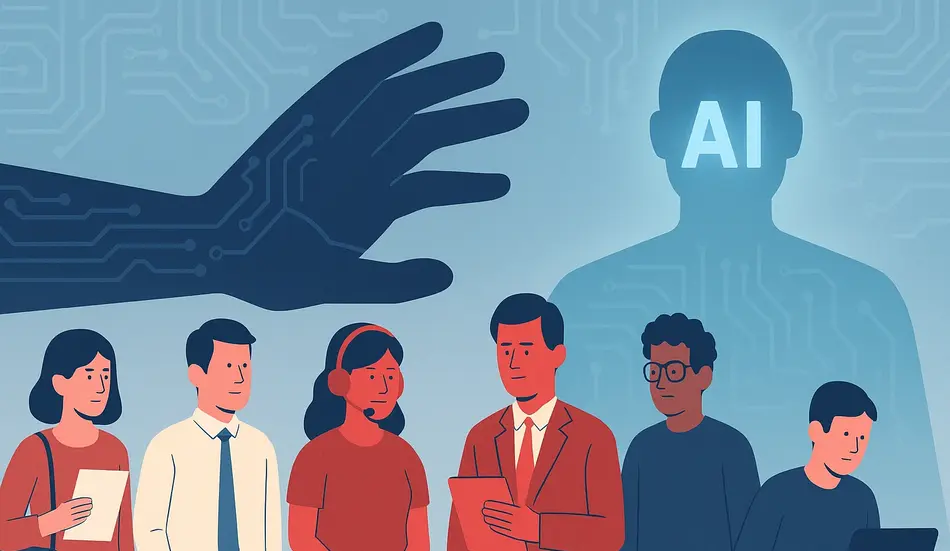Navigating the AI Revolution
The world of work is undergoing a seismic shift, and for today’s conversation is all about understanding how artificial intelligence (AI) is transforming the job market. As industries like healthcare, hospitality, and leisure experience both growth and disruption, concerns are mounting about AI’s potential to replace human workers. Major corporations such as Microsoft, Walmart, and Business Insider have already begun laying off employees, citing the rise of AI in the workplace as a contributing factor. In this comprehensive blog post, we’ll explore which jobs are most at risk, what skills will be essential in the future, and how you can adapt to thrive in this new era.
Understanding the Current Landscape
The latest jobs report reveals a complex picture. While some sectors are adding jobs, others are seeing significant layoffs. The underlying cause? Automation and digitization—terms that often serve as proxies for AI. For example, Procter & Gamble recently announced plans to cut up to 7,000 jobs, attributing the move to digitization and automation. Although the company avoided using the term “AI,” the implication is clear: roles that involve repetitive tasks, data entry, and large-scale document processing are increasingly vulnerable.
Why Are These Jobs at Risk?
AI excels at tasks that are repetitive, data-driven, and require minimal human judgment. This includes:
- Data entry and analysis
- Sorting and processing documents
- Basic communication and rote memorization
These are precisely the kinds of jobs that can be automated, leading to workforce reductions in affected industries.
Is There Such a Thing as an AI-Proof Job?
One of the most pressing questions is whether any jobs are truly safe from AI. The answer lies in the nature of the work itself. Positions that require a high degree of human interaction, creativity, and emotional intelligence are less likely to be automated. AI struggles to replicate the nuances of interpersonal relationships, innovation, and complex problem-solving.
Key Characteristics of AI-Resistant Roles
- High levels of human interaction
- Creative problem-solving
- Emotional intelligence and empathy
- Coordination and collaboration
Jobs that rely on these skills are more likely to withstand the AI revolution.
AI-Proof Careers
Roles built on creativity, empathy, and human connection are far less likely to be replaced by AI. Employers can future-proof their organizations by hiring talent with the interpersonal and problem-solving skills machines can’t replicate. Post your job on WhatJobs today and connect with professionals whose human strengths make them AI-resistant.
Post a Job Free for 30 Days →A Closer Look: Which Careers Are Most at Risk?
Let’s examine some specific professions and how they are being impacted by AI:
Accountants
Accountants are facing significant challenges as AI becomes more adept at handling data entry and analysis. The automation of these tasks means that many traditional accounting roles are at risk.
Data Scientists
While data scientists may be somewhat insulated due to the complexity of their work, AI is rapidly improving its ability to analyze large datasets. Those who can perform analyses beyond the capabilities of AI will remain valuable, but the field is becoming increasingly competitive.
Radiologists and Medical Professionals
The impact of AI on healthcare is nuanced. Radiologists, whose work involves analyzing medical images, are particularly vulnerable as AI systems become more proficient at interpreting scans. However, the healthcare sector as a whole is unlikely to see widespread unemployment due to ongoing shortages of medical professionals.
Digital Marketers
The effect of AI on digital marketing depends on the nature of the work. Routine tasks, such as creating basic advertisements, are easily automated. Marketers who focus on strategy, creativity, and human connection will continue to be in demand.
Graphic Designers
Graphic designers are also feeling the pressure, as AI tools can now generate visuals and charts with impressive speed and accuracy. Those who can offer unique creative insights and adapt to new technologies will have a competitive edge.
Adapting to the New Reality: What Skills Should You Learn?
With so much uncertainty, it’s natural to wonder which skills will be most valuable in the future. The key is adaptability. Rather than specializing in a single, narrowly defined skill, focus on learning how to learn. This approach will enable you to pivot as the job market evolves and acquire new competencies as needed.
Essential Skills for the Future
- Adaptability and lifelong learning
- Critical thinking and problem-solving
- Communication and collaboration
- Creativity and innovation
By cultivating these abilities, you’ll be better equipped to navigate the changing landscape and seize new opportunities as they arise.
The Human Element: Why People Still Matter
Despite the rapid advancement of AI, there are aspects of work that machines simply cannot replicate. Human connection, empathy, and the ability to inspire and motivate others remain irreplaceable. As you plan your career, prioritize roles that leverage these uniquely human qualities.
Minimal Bullet Points: Key Takeaways
- AI is transforming the job market, with some roles more at risk than others.
- Jobs requiring human interaction, creativity, and emotional intelligence are more resilient.
- Adaptability and a willingness to learn are essential for future success.
- Focus on developing skills that AI cannot easily replicate.
Frequently Asked Questions (FAQ)
Which industries are most impacted by the Focus Keyphrase and AI advancements?
Industries such as accounting, data analysis, healthcare (especially radiology), digital marketing, and graphic design are experiencing significant changes due to the Focus Keyphrase and AI advancements. Jobs that rely heavily on routine tasks are most affected.
What can workers do to stay relevant according to the Focus Keyphrase?
To stay relevant, workers should focus on developing skills that AI cannot easily replicate, such as creativity, emotional intelligence, and adaptability. The Focus Keyphrase emphasizes the importance of lifelong learning and flexibility in career planning.
Are there any truly AI-proof jobs as per the Focus Keyphrase?
While no job is entirely AI-proof, the Focus Keyphrase suggests that roles involving high levels of human interaction, creativity, and complex problem-solving are less likely to be automated. These positions offer greater long-term security.
Live Example: Navigating the AI Job Market as a User
Imagine you’re a mid-career professional in digital marketing. You’ve noticed that many routine tasks, such as creating basic ad copy and analyzing campaign data, are now handled by AI tools. At first, this shift feels threatening. However, by focusing on strategic planning, creative storytelling, and building authentic relationships with clients, you find new ways to add value that AI cannot replicate. You also invest time in learning about emerging technologies and adapting your skill set. As a result, you not only keep your job but also position yourself as a leader in the evolving digital landscape.




